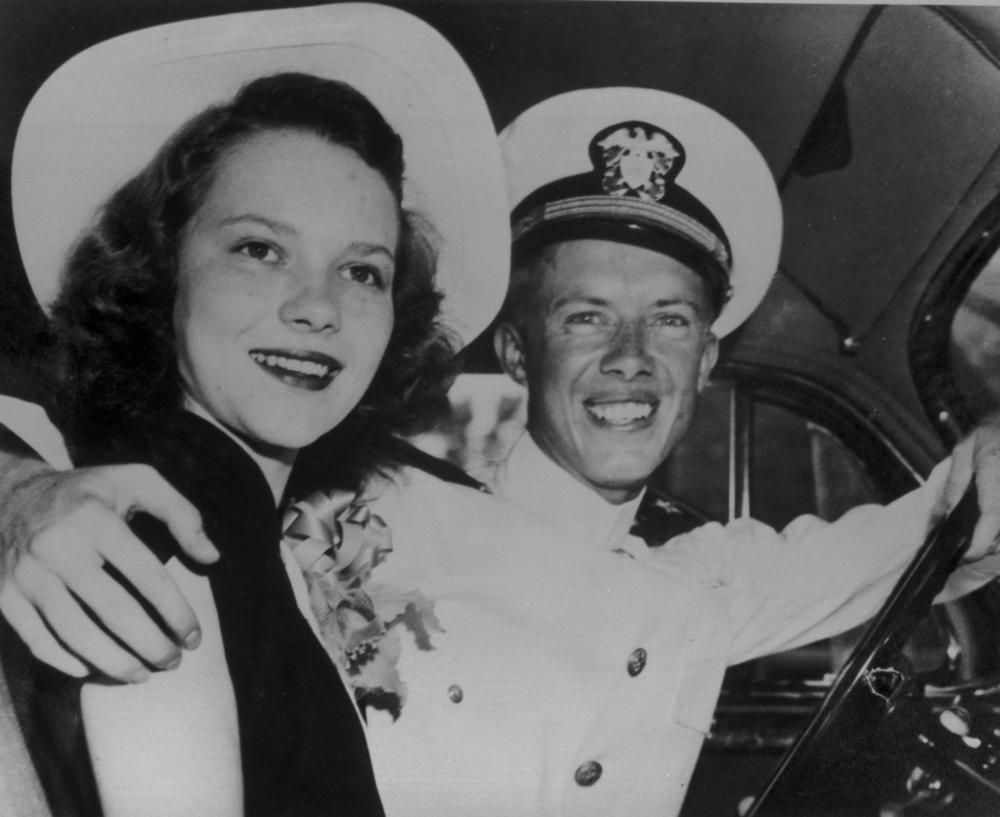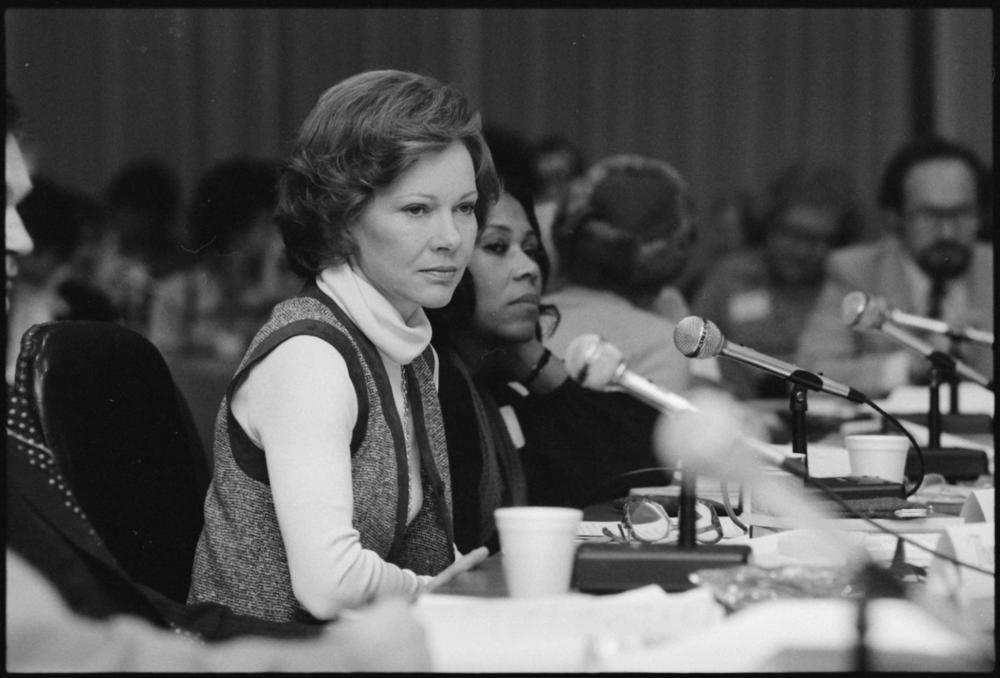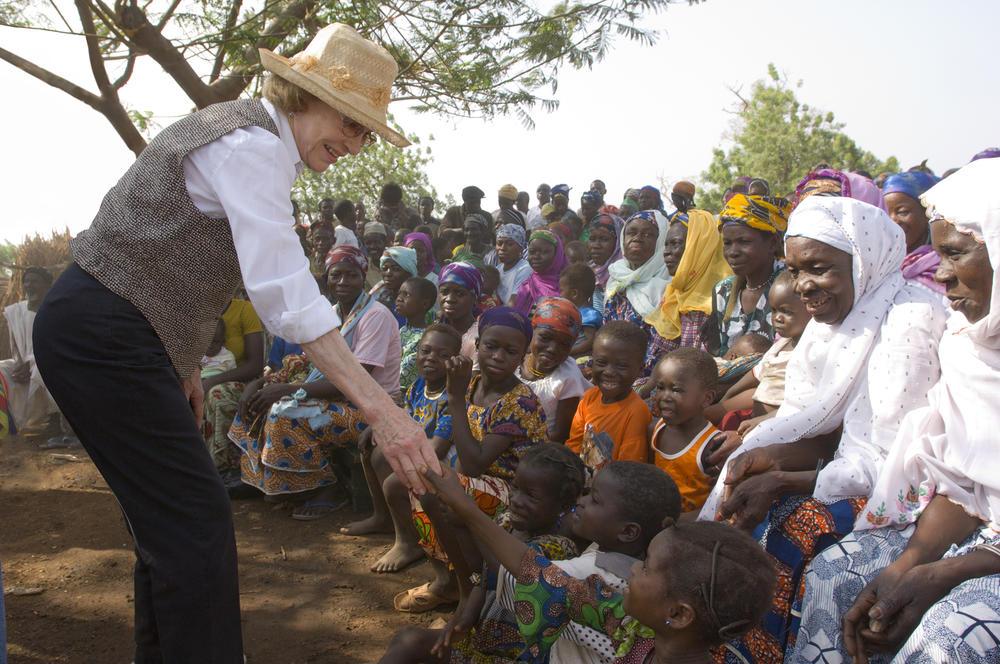
Caption
This photo was taken on July 7, 1946, when Rosalynn Smith and Jimmy Carter were married in Plains, Ga.
Credit: Jimmy Carter Library
Rosalynn Carter, partner of 39th U.S. President Jimmy Carter, changed the way Americans view mental health, and spent decades reducing stigma and fighting diseases through her work at the Carter Center.
She passed away Sunday, Nov. 19, at 2:10 p.m. at her home in Plains, Georgia, at the age of 96. She died peacefully, with family by her side, a statement from the Carter Center said.
After President Carter began hospice care in February 2023, the Carter family stated in May that the former first lady had dementia and continued to live happily at home with her husband, enjoying Plains and visits with loved ones. The family shared the news in hopes of increasing important conversations about mental health at kitchen tables and in doctor’s offices around the country.
Mrs. Carter began hospice care at home on Nov. 17, 2023. She and President Carter were last seen in public together while riding in the back of a Suburban with the windows down during the Plains Peanut Festival in September.
“Rosalynn was my equal partner in everything I ever accomplished,” President Carter said in the statement. “She gave me wise guidance and encouragement when I needed it. As long as Rosalynn was in the world, I always knew somebody loved and supported me.”
She is survived by her children — Jack, Chip, Jeff, and Amy — and 11 grandchildren and 14 great-grandchildren. A grandson died in 2015.
“Besides being a loving mother and extraordinary First Lady, my mother was a great humanitarian in her own right,” said Chip Carter. “Her life of service and compassion was an example for all Americans. She will be sorely missed not only by our family but by the many people who have better mental health care and access to resources for caregiving today.”
Forthcoming memorial events and funeral ceremonies will be posted on www.rosalynncartertribute.org.
Eleanor Rosalynn Smith lived her life as a love story. She wrote in her 1984 autobiography, First Lady From Plains, that she grew up three years and 3 miles apart from Jimmy Carter. Their more than 77 years together was the longest-lasting presidential marriage in history.
But Rosalynn Carter’s legacy is more than what she accomplished alongside her partner in the Georgia governor’s mansion or in the White House. She leaves a legacy of caring, compassion and community with the Carter Center.
Carter was born during the summer of 1927 — just two years before the Great Depression. Her family knew hardship in their small South Georgia city of Plains.
Kathryn E. Cade, who served on Mrs. Carter’s staff in the White House, also served as vice chair of the Carter Center’s Board of Trustees and a member of the Center’s Mental Health Task Force.
"We've often talked about her growing up, you know, her childhood and growing up in Plains," she said. "And the two things that she always says is 'We were poor' and 'We didn't know it.'"
Carter became a caretaker for her siblings after her father died.
"I think that what shaped her concern for vulnerable people was really this upbringing where you took care of one another," Cade said, "that that was part of the ethos of being raised in a small town."

This photo was taken on July 7, 1946, when Rosalynn Smith and Jimmy Carter were married in Plains, Ga.
Rosalynn Smith married James Earl “Jimmy” Carter, then a newly commissioned officer just out of the Naval Academy, in 1946. For the next seven years she followed her husband from one Navy base to next, raising three sons, many times on her own as her husband pursued his naval career.
But when Jimmy Carter’s father died in 1953, Jimmy decided to move his family back to Plains without discussing it with Rosalynn.
For the next 10 years she worked side by side with her husband in the family peanut farming business.
In 2002, Mrs. Carter told GPB, "When we came back to Plains, [he and I] started keeping our books at our farm supply business," she said. "And pretty soon he was asking me questions about the business because I knew a lot about it on paper."
From 1963 to 1974, Jimmy Carter announced his political ambitions by running for the Georgia state Senate, and the governor’s office twice, winning in 1970. During this time Rosalyn gave birth to their only daughter, Amy, and found that she had a knack for politics.
"She was seen as Jimmy Carter's secret weapon," journalist Jonathan Alter said. "Rosalynn Carter allowed her husband to essentially be in two places at the same time, could campaign in two places at the same time. That's a huge asset in politics."
Georgia had one of the worst mental health care programs in the nation in the decades leading up to Jimmy Carter’s run for governor in the early 1970s. And so when mental health became an issue on the campaign trail, Rosalynn noticed.
She also found her lifelong calling while talking with voters about their concerns as she campaigned for her husband eventually surprising him at one of his rallies.
In a 2012 town hall on mental health in Americus, she recalled how she snuck into the crowd listening to a stump speech to get then candidate Jimmy Carter on the issue and on the record.
"Well, [Jimmy Carter] reached for my hand before he looked before he knew who I was and he said, 'What are you doing here?' And I said, 'I want to know what you're going to do for people with mental illnesses when you're governor of Georgia.' And he said, 'We're going to have the best program in the country and I'm going to put you in charge of it.'"
Rosalynn Carter indeed advocated for better mental health care during the years in the Georgia capital.
Later, less than a month after Jimmy Carter won the presidency in 1976, she convinced her husband to create a presidential commission on mental health.

During the 1970s, Rosalynn Carter chairs a meeting in Chicago for the President's Commission on Mental Health.
Already President Carter’s most trusted advisor, she became the first first lady to have an office in the East Wing.
Rosalynn Carter held hearings across the country, testified before Congress and spearheaded passage of the Mental Health Systems Act of 1980.
She traveled to South America and the Caribbean on a diplomatic mission for the president, campaigned states to adopt early child immunization programs, endorsed and lobbied for the Equal Rights Amendment, and pushed her husband to add more women and minorities to his cabinet and federal judgeships.
Often considered to be more politically savvy than her husband, she sat in on cabinet meetings and the White House staff grew to respect her candid and sometimes tough advice on issues. She soon earned the nickname of the “Steel Magnolia” in the East Wing.
After losing to Ronald Reagan in the 1980 election, the Carters found themselves at a crossroads.
"I was bitter about being defeated; yes," Mrs. Carter told GPB. "And, well, first we wrote books and in writing the books, we realized how being in the governor's mansion, the White House had broadened our view of what was important in the world. And I know I woke up one night, Jim was sitting straight up in the bed. I thought he was sick because he always sleeps all night long. And he said, I know what we can do at the presidential library. We can have a place to resolve conflict. So it really started to solve conflicts."
They formed the Carter Center in 1982, and it quickly moved beyond just resolving conflicts. They soon expanded their work to include disease eradication, election monitoring, building homes with Habitat for Humanity, and high-profile peace missions.
Mrs. Carter also created the Carter Center’s Mental Health Program, promoting mental health programs and policy around the world, as well as founding the Rosalynn Carter Institute for Caregivers at Southwest Georgia State University.
In 1999, she was awarded the Presidential Medal of Freedom as well as being inducted into the National Women’s Hall of Fame in 2001.

Former first lady Rosalynn Carter greets children in Tingoli, Ghana, during a Carter Center visit in 2007 to see the country's progress eradicating Guinea worm disease and controlling trachoma, a devastating eye disease.
For the next five decades Rosalynn Carter would work diligently to remove the stigma of mental illness.
Rosalynn Carter was the nation’s leading mental health advocate for much of her life. First in the Georgia Governor’s Mansion, then in the White House, and later at The Carter Center, she urged improved access to care and decreased stigma about issues surrounding mental health. One in 10 older Americans have dementia, a condition that affects overall mental health.
Cade says in part because of Mrs. Carter’s work, the way that people think about mental health and mental illness today is dramatically different from the way that people thought about it just 50 years ago.
"Today, most people are not afraid to seek help," Cade said. "They're not afraid to admit they need help. And today, most people can recover from mental illnesses. So, the hope of recovery is real and tangible."
Grandson Jason Carter, chair of the Carter Center Board of Trustees, said, "I think the work of the Carter Center is really testament to my grandfather's ability and my grandmother's ability to see the humanity in people far across the world in far different situations than they are and understand that those are people just like them. And whether that comes from their faith, their experience or the combination thereof ... it's become a powerful, powerful motivator and a powerful tool to do real good in the world."
Eve Byrd, who worked as director of the Mental Health Program at the Carter Center, said that as passionate as Mrs. Carter was advocating for those with mental illness, she was most proud of her family.
"I can't tell you how many times she would, after a meeting, would say that she was getting together with everybody here at the Carter Center, all of her children and grandchildren and great-grandchildren for a dinner," Byrd said. "And we would tease and I'd say, 'Well, I better let you get on with your way and do some cooking, right, Mrs. Carter?' And we would kind of laugh together.
As the founder of the Rosalynn Carter Institute for Caregivers, Mrs. Carter often noted that there are only four kinds of people in this world: those who have been caregivers; those who are currently caregivers, those who will be caregivers, and those who will need caregivers.
Rosalynn Carter leaves a family legacy of four children, 12 grandchildren and many great-grandchildren.
When asked how she would like to be remembered, Rosalynn Carter once said, “ I would like for people to think that I took advantage of the opportunities I had and did the best I could.”